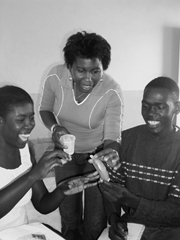|
|
 Previous Chapter Previous Chapter  Previous Page Next Page Previous Page Next Page  Next Chapter Next Chapter 
Provide Services with Care and Respect
Young people deserve nonjudgmental and respectful care no matter how young they are. Criticism or unwelcoming attitudes will keep young people away from the care they need. Counseling and services do not encourage young people to have sex. Instead, they help young people protect their health.
 To make services friendly to youth, you can: To make services friendly to youth, you can:
- Show young people that you enjoy working with them.
- Counsel in private areas where you cannot be seen or overheard. Ensure confidentiality and assure the client of confidentiality.
- Listen carefully and ask open-ended questions such as "How can I help you?" and "What questions do you have?"
- Use simple language and avoid medical terms.
- Use terms that suit young people. Avoid such terms as "family planning," which may seem irrelevant to those who are not married.
- Welcome partners and include them in counseling, if the client desires.
- Try to make sure that a young woman's choices are her own and are not pressured by her partner or her family. In particular, if she is being pressured to have sex, help a young woman think about what she can say and do to resist and reduce that pressure. Practice skills to negotiate condom use.
- Speak without expressing judgment (for example, say "You can" rather than "You should"). Do not criticize even if you do not approve of what the young person is saying or doing. Help young clients make decisions that are in their best interest.
- Take time to fully address questions, fears, and misinformation about sex, sexually transmitted infections (STIs), and contraceptives. Many young people want reassurance that the changes in their bodies and their feelings are normal. Be prepared to answer common questions about puberty, monthly bleeding, masturbation, night-time ejaculation, and genital hygiene.
 Previous Chapter Previous Chapter  Previous Page Next Page Previous Page Next Page  Next Chapter Next Chapter 
|


 Previous Chapter
Previous Chapter Previous Page
Previous Page

 To make services friendly to youth, you can:
To make services friendly to youth, you can: